- Home
- John Bellairs
The Hand of the Necromancer Page 5
The Hand of the Necromancer Read online
Page 5
With a laugh, Tim slapped him on the shoulder again. "For what? You put Sarah into position to score, and we got an out left to go. Batter up!"
Their luck held, and the next batter slammed a home run. Paul Deakins struck out, but by then nobody cared, because now the team was ahead by one, and Eddie was almost purple with anger. As the teams changed sides,
Professor Childermass' voice boomed across the park: "Lunch is now served! Mr. Dixon and Miss Channing are to report to the chow line on the double, or I'll throw it all out!"
"Go on," Tim said with a grin. "The way Eddie's screamin' at his guys, I don't think the game's gonna last any longer. Thanks, both of you."
Tim was right. Three of Eddie's players were already walking off in disgust, because Eddie was blaming them for falling behind. The game was going to end with Tim's team up by one, but Eddie got in a parting shot. "Go to the old oddball, you babies!" he yelled. "Next time I catch ya alone, you're in trouble, Dixon! I'm gonna stomp ya!"
Even Eddie's mean-spirited taunts failed to make Johnny feel bad. He grinned at Sarah and shrugged, and she giggled. It was shaping up to be the best day Johnny had seen since Fergie left for Ohio.
If only it could have gone on like that, he would have been very happy.
CHAPTER SEVEN
Johnny, Sarah, and the professor sat at the concrete picnic table and wolfed down the tasty hamburgers. Sarah said they were the best burgers she had ever eaten, and the professor gave her a courtly bow of thanks. Then he brought out a surprise, one of his luscious Sacher tortes, an especially rich, gooey, and delicious chocolate cake. After one bite Sarah moaned, "I think I've died and gone to heaven!"
"My compliments on your discriminating palate," said the professor, beaming. "You are a true gourmet." A crow in a nearby tree cawed, and he grimaced. "Crows are unlovely birds. That one wants a handout, but he can forget it." They had made quite a bit of headway on the cake when Johnny looked to see what had happened on the baseball field. He almost choked.
Standing alone on the diamond was a tall, skinny, bald man dressed in black. His face was gaunt, and from beneath his heavy eyebrows his eyes glowered at them from deep, shadowy sockets.
It was Mattheus Mergal.
Johnny swallowed, reached for his paper cup, and washed the mouthful of cake down with lemonade. "Professor," he gasped. "Look over there!"
"Where?" The professor adjusted his spectacles and stared at the figure in black. "I see nothing more alarming than a gentleman with a dubious sense of style, John. What should I be looking at?"
"It's him," Johnny said. "It's Mr. Mergal, the one from the museum. He's spying on you."
"Indeed? Well, I shall give him something to think about!"
The professor rose, but Johnny was at his side in a second, tugging at his arm. "Oh, gosh, Professor, don't go. He's a terrible person!"
Sarah had heard nothing of Johnny's meeting with Mr. Mergal, and she looked from Johnny to the professor in bewilderment. "Who in heck are you two talking about?" she asked.
"Him," Johnny said, turning and pointing. He blinked, his mouth hanging open in surprise, his trembling finger pointing at an empty park.
Mergal was gone.
It's impossible, Johnny thought, staring at the now-deserted baseball diamond. Only a few beech and white ash trees stood scattered about. Mergal had nowhere to hide, and yet he had completely vanished. "Hmpf," the professor said. "Obviously the man is a coward. Let's forget him and finish our meal like civilized people."
The appearance of the black-clad stranger had cast a pall over the afternoon. The sun grew hazy and bleak. A dry wind began to rattle in the trees, though at ground level it was just a skittish breeze. Johnny felt a chill inside him, and he kept looking around nervously as the three finished their picnic and began to pack the hamper. "That's funny," he said.
"What?" Sarah asked, sounding annoyed.
"Well, there were lots of people here just a few minutes ago. The guys playing ball, and about a dozen families having picnics, and some people tossing a softball over there. They've all left."
Professor Childermass scowled. "Not so surprising. After all, it is getting on into the afternoon, and it's starting to look a little cloudy." His voice sounded uncertain. "Even holiday pleasures have to come to an end. Who wants to lug this basket back to the car?"
As Johnny turned to take the basket, he froze in sudden alarm. Off toward Emerson Street was a little grove of quaking aspens, and standing in the middle of it was the dark figure of Mergal. The man raised a thin stick, about five or six feet long. It was not perfectly straight, but looked as if it might be the sawed-off trunk of a sapling or perhaps a tree branch trimmed of all its twigs. He held this staff at one end, and for a moment it pointed straight up at the sky. Then Mergal swung the stick down in an arc and hit the ground. He immediately spun on his heel and strode away, disappearing behind the trees. Johnny squeaked out a frightened cry.
"Now what?" demanded the professor in a quarrelsome voice, looking up from the tablecloth he was folding. "Don't tell me you're seeing—good heavens, what a gust!"
A stiff east wind had sprung up, raising dust on the infield and snatching leaves from the trees. The paper plates and cups sailed off from the picnic table too quickly for any of them to do more than grab at them and miss. The professor's worn white linen tablecloth tore itself from his grasp and went dancing away, billowing as if an evil spirit had thrown it on as an early Halloween costume. Professor Childermass ran toward it, but the cloth puffed and twirled just beyond his reach. Johnny felt the hairs on his neck rising. The wind-dancing cloth was just like everyone's idea of a sheet-clad ghost, tricky and elusive and somehow threatening.
A wrack of grayish-purple clouds boiled up from the east and spread fantastically fast, obscuring the sun. "Gosh," Sarah said. "It's gonna storm, but the weatherman said—"
A bolt of lightning cut off her voice. It was dazzlingly bright, and it slammed to earth on the baseball field. Johnny gasped as a shock wave pounded the air from his lungs. An instant later a terribly loud thunderclap nearly shook them off their feet. Johnny and Sarah shrieked simultaneously. Fifty feet away the professor gave up his chase, and the tablecloth kited up over the treetops as it dashed into the troubled sky.
"Run, children!" Professor Childermass shouted. "Keep away from the trees and head for my car!" He came running back to snatch up the picnic hamper, and all of them dashed for cover as another blinding bolt struck not twenty yards away. Johnny clapped his hands over his ears and looked over his shoulder, only to see the concrete table where they had been eating split into fragments. Marble-sized pieces of concrete suddenly pelted to earth all around the fleeing trio, the fragments blackened and still smoking. They rushed up a grassy embankment to Emerson Street, and a hard rain began to lash them, a cold rain mixed with painful hail. The white pellets of ice thumped against their heads and backs and arms, stinging like small rocks.
The professor shielded his glasses with one hand. "This will never do. It's like being under fire from an army of Lilliputians!" They were still a block away from the maroon Pontiac. The rain slammed into them twice as hard as before, and hail the size of mothballs began to smack against the pavement. Professor Childermass seized the door handle of a beat-up blue Chevy sedan and wrenched the door open. "Pile in, both of you!"
Johnny and Sarah tumbled into the back seat, and Professor Childermass clambered into the front passenger seat. He slammed the door as the fierce hail clattered against the windshield and the top of the car. A vengeful wind rocked the car on its springs, as if the storm were trying to rip it apart to get at them. More sizzling bolts of lightning struck all around them, each so bright and so loud that the world suddenly turned white and the terrible, vibrating thunder exploded before the lightning had even faded.
Every time the lightning flashed, Johnny and Sarah screamed. "We're all right," Professor Childermass shouted. "We are in a vehicle insulated from the ground by four rubber tires
. That makes us perfectly safe—"
Another bolt struck a maple ten yards away, blasting a cloud of wood splinters and leaves into the rain-streaked air. The professor did not scream. Instead, in a soft voice he rapidly recited the rulers of the Roman Empire and their reputed heirs from Julius Caesar to Kaiser Wilhelm and Czar Nicholas. Then he muttered a brief prayer to St. Michael. He did that only when something really bothered him.
Their panting breath fogged the car windows. The upholstery was split and ratty, and the air in the car smelled unpleasantly of engine oil and rust, but the banged-up old sedan was a welcome haven. Fortunately the furious storm lasted for only ten minutes before it blew away as suddenly as it had come. Billowing black clouds smoked away to the west, trailing skirts of rain. The sun peeked out again. All around, trees dangled broken limbs and dripped onto the soggy ground. "I think it's over," Johnny ventured.
"Possibly," returned Professor Childermass. "Let's get to my car, and I'll take you both home."
As they were leaving the Chevrolet, a frowning man ran up. He was about six feet tall and muscular, with a heavy, bristly jaw, a crooked nose, and two straight, jet-black eyebrows over his glaring brown eyes. "Hey," he said in a rough, menacing tone, "what's the idea? That's my car you was in!"
Professor Childermass drew himself up to his full five feet seven. Behind his gold-rimmed spectacles, his eyes glittered. He barked out his words: "My dear sir, stop apologizing! I refuse to listen to another word. Don't belittle your car—be proud of it!" Then, sounding kinder, he added, "Your somewhat worn sedan gave these defenseless children safety during the late meteorological disturbance. In fact, as automobiles go, it's even sort of a hero! So although your Chevrolet appears to be in a run-down, battered, and even disreputable condition, I must congratulate, not scold, you."
For a moment the man just looked puzzled. "Well—well, gosh, thanks!" he said at last with a shy grin.
The professor gave him a friendly handshake. "Think nothing of it. I know I won't. All right, troops!" he snapped. "Ahead, quick march!"
Johnny took a fearful look back. The park was a mess. Hail had beaten down the flower beds and had pummeled the baseball diamond to muddy mush. Lightning had splintered five or six trees, and the wind had ripped big branches off others. Leaves were scattered everywhere, on the grass, on the pavement, even plastered to all the cars parked nearby. The picnic table lay in shattered ruins. The rain-washed air had a scent of ozone, reminding Johnny of the way his electric-train set smelled when both engines were clattering around the track. "It was a magic storm," Johnny said quietly.
Sarah gave him a strange look. "Magic? Are you crazy?"
Johnny bit his lip. "I saw Mr. Mergal doing something with a—a wand, I guess it was. He summoned the storm somehow, I swear he did. And the lightning was chasing us."
"Not another word," Professor Childermass said in a warning tone. They climbed into his Pontiac, and as they rolled away from the devastated park, Johnny felt more frightened and worried than ever.
CHAPTER EIGHT
Sarah wanted to know all about Mr. Mergal, but for days Johnny put her off. He didn't want his new friend to start wondering if maybe he was a little nutty. The rest of the week passed, and then Monday came around again. It happened to be another delivery day, and Johnny settled down to what had become a normal routine.
This time, though, something was different about the Gudge Museum. It still had the creaks and groans of any old house, but Johnny kept thinking he heard something else, something soft and sly and sinister. It was exactly like hearing someone whisper from the next room, a maddening s-ss-ss of sound, with an occasional evil chuckle thrown in. But every time Johnny went to find the source of the noise, it seemed to be coming from the room he had just left. Sometimes Johnny was too imaginative for his own good. In his mind he conjured up all sorts of explanations for the unusual whispery sounds. It might be the mysterious Mr. Mergal, slipping from one hiding place to another, planning to murder him. It might be old Blackleach's ghost, roaming the halls of the museum, guarding his witchy treasures. It might even be the spirit of Sophonsoba Peabody, gliding sorrowfully from room to room, trying to find someone to listen to one of her terrible poems.
Whatever it was, Johnny grew more and more nervous listening to the sound. He tried to control his wild fantasies, telling himself that the noises were just the sound of tree leaves brushing against the wall outside, or the cranky old air-conditioning system getting ready to break down. Still, he was so jumpy that when the loading door buzzer sounded, he yelped and leaped off his chair. With a red face, he hurried to open the back door. It was just the delivery man, and he had Johnny sign for a box of soap and paper towels. Johnny hurriedly stored them away and then left for home.
He was jumpy all evening. He had dinner and then sat in the parlor and watched a Red Sox baseball game with his grandfather. The black-and-white television didn't have the greatest reception in the world, and the static was so bad that it was a little like watching a ball game played in the middle of a blinding blizzard. Unfortunately the Red Sox had not improved as the summer wore on. They lost to the Cleveland Indians, a team that was giving the New York Yankees a tough contest for the pennant that year.
It was a hot night, and after Johnny went to bed, he tossed and turned restlessly. His window was wide open, but the breezes that came in were sluggish and warm. His Big Ben alarm clock ticked and ticked, its monotonous metallic voice going on and on, like a boring speaker droning on about nothing. Every now and then a car would drive past, the reflection of its headlights making patterns of light and shadow move across his bedroom ceiling. Once a shadow vaguely like a hand crept above his bed, and Johnny turned onto his stomach and closed his eyes. Finally, after midnight Johnny drifted off to sleep. Some time later he began to dream.
In the dream he was working in the museum as usual, dusting the exhibits in the Peabody Room. He felt someone's eyes on him the whole time, and he got jittery. He kept thinking he heard someone whispering, and he looked this way and that, but he was all alone. Then, as he had finished carefully cleaning the vases on the mantel, he heard a low, nasty laugh behind him. "That's right, baby Johnny," said the taunting voice of Eddie Tompke. "Make 'em nice and pretty now!"
Johnny whirled, but no one was behind him. "Eddie? Darn it, where are you hiding? You're sure not s'posed to—"
"Here I am," said the voice from the other end of the mantel.
Johnny looked, and to his horror he saw a blue vase leap off the mantel and fly across the room. It shattered on the floor. The nasty voice said, "See, I learned how to become invisible, baby Johnny. I'm gonna make your life re-e-al interesting from now on!" And one, two, three other vases smashed against the wall. Then unseen hands began to rip the precious manuscripts of Sophonsoba Peabody's poetry. Fragments of sonnets and ballads whirled through the air like snow. And at that moment Miss Ferrington's harsh voice came from the corridor: "Johnny Dixon! Here I come!"
Johnny tried to run and found himself held back. Something was strangling him, choking him, as Eddie Tompke's laughter rang out. Desperately, Johnny lunged—
And fell out of bed, waking himself up. He was all tangled in his sheets, and he was sweating. He struggled up, angry at himself. What a baby! The luminous hands of his clock said that it was after 3:00 a.m. Johnny switched on his reading lamp to make his bed again. He was very fussy about certain things. They had to be just right. He hated sleeping in a rumpled bed, and he carefully made hospital corners as he tucked the sheet around the mattress.
He had put on his glasses to do this task. He switched off the light and then for some reason he looked out his window. He had a good view of Fillmore Street from up there. Everything looked spooky and deserted at this time of night. A high moon that he could not see cast a dim silvery light over the neighborhood. The professor's stucco mansion glimmered in the glow, looking unearthly, the way Johnny imagined Edgar Allan Poe's House of Usher looked even in the daylight. Except, h
e thought, the House of Usher probably did not have the square Italian cupola with the ridiculous radio aerial that his old friend's house sported.
The shadow of a small cloud drifted over the roof of the professor's house. Johnny yawned. Then he stiffened and leaned forward for a closer look, pressing his nose against the screen. Was that gliding black shape a shadow? It was hard to be sure. The patch of darkness came flowing down the roof and then moved onto the stucco wall.
Johnny's heart seemed to stop. The shadow had a definite shape. It looked like a man, dressed all in black from head to foot. And it clung to the stucco wall just like an insect. It scuttled around, hanging head down, then moving sideways, exactly as a fly might creep over the frosted surface of a cake. It seemed to be fiddling with a window screen.
Johnny leaped up and ran downstairs. He switched on a light and grabbed the telephone. His hand was shaking, but he managed to dial the professor's number. It rang once, then twice. "Come on, Professor," groaned Johnny. Three times. Four.
After the seventh ring, the professor picked up the phone. "Hello!" he roared in his crabbiest voice. "Whoever this is, I hope you're calling about an emergency. Someone had better be on the way to the hospital, at least!"
"Professor!" said Johnny. "It's me! There's a guy tryin' to climb in your bedroom window!"
"Johnny?" muttered the professor in a surprised voice. "The devil you say! Hold on—if I'm not back in five minutes, call the police!"
Johnny was not wearing his watch. He tried counting seconds the way he had learned in the Boy Scouts, murmuring, "One, one thousand, two, one thousand, three, one thousand, four..."
He lost count at two minutes and something and was about to hang up and call the police anyway when the professor picked up the phone again. "False alarm, John," he said in a tired voice. "No one's there. What made you think someone was trying to break in?"

 The Curse of the Blue Figurine
The Curse of the Blue Figurine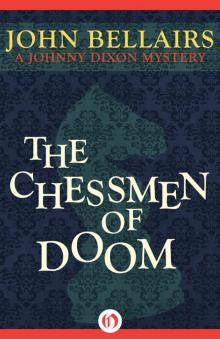 Chessmen of Doom
Chessmen of Doom Secret of the Underground Room
Secret of the Underground Room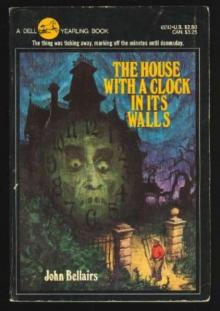 The House With a Clock in Its Walls
The House With a Clock in Its Walls The Vengeance of the Witch-Finder
The Vengeance of the Witch-Finder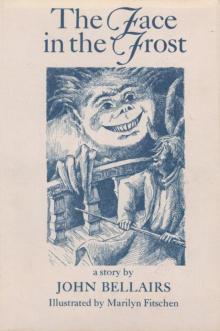 The Face in the Frost
The Face in the Frost Revenge of the Wizard's Ghost
Revenge of the Wizard's Ghost Spell of the Sorcerer's Skull
Spell of the Sorcerer's Skull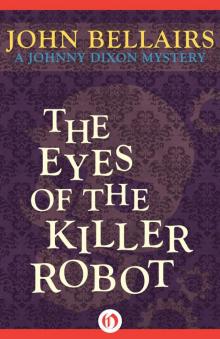 Eyes of the Killer Robot
Eyes of the Killer Robot Mummy, the Will, and the Crypt
Mummy, the Will, and the Crypt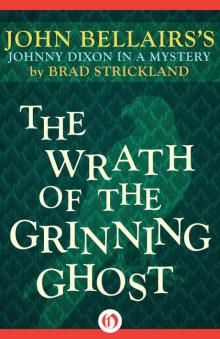 Wrath of the Grinning Ghost
Wrath of the Grinning Ghost The Mansion in the Mist
The Mansion in the Mist The Doom of the Haunted Opera
The Doom of the Haunted Opera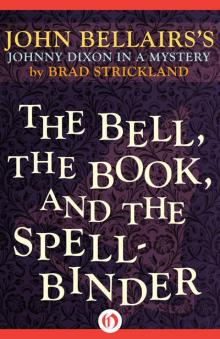 The Bell, the Book, and the Spellbinder
The Bell, the Book, and the Spellbinder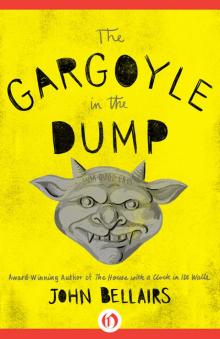 The Gargoyle in the Dump
The Gargoyle in the Dump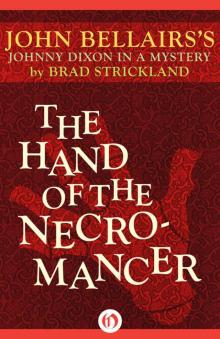 The Hand of the Necromancer
The Hand of the Necromancer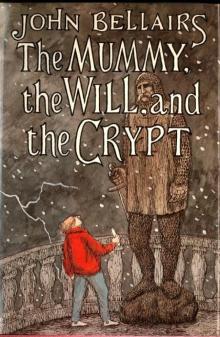 The Mummy, the Will, and the Crypt
The Mummy, the Will, and the Crypt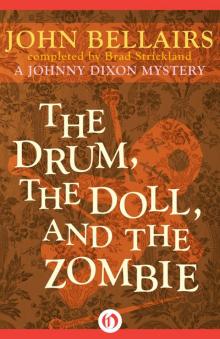 Drum, the Doll, and the Zombie
Drum, the Doll, and the Zombie The Specter from the Magician's Museum
The Specter from the Magician's Museum The Letter, the Witch, and the Ring
The Letter, the Witch, and the Ring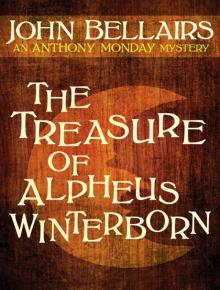 The Treasure of Alpheus Winterborn
The Treasure of Alpheus Winterborn The Dark Secret of Weatherend
The Dark Secret of Weatherend The Figure in the Shadows
The Figure in the Shadows